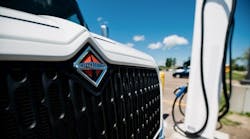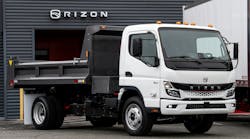Over the past few years, hordes of global brands—spanning the commercial product, financial, energy markets, and more—have announced their commitment to sustainability, recently demonstrated by the 81 businesses that have committed to sign President Obama’s American Business Act on Climate Pledge. This momentum is reassuring, as the world needs to see considerable leadership from the private sector in order to move beyond fossil fuels and mitigate climate change.
While there have been impressive corporate commitments to using renewable energy, green building retrofits, waste stream reduction, process efficiency improvement projects, and a greater shift to using intermodal rail transportation, there has been less focus on over-the-road transportation—until now. As one leading shipper recently confirmed, its internal and for-hire on-highway transportation accounts for a staggering 50% of its overall carbon footprint, providing tremendous opportunity for improvement. Fleet initiatives aimed at cutting fuel consumption rank among the most effective ways to reduce greenhouse gas emissions, not to mention fuel costs.
Anheuser-Busch’s recent deployment of 163 compressed natural gas (CNG) tractors in its Houston and St. Louis brewery operations, part of the company’s Seed-to-Sip initiative to cut “logistics-related” carbon emissions by 15% through 2017, is an industry-leading example of a company’s proactive efforts in this area.
While Anheuser-Busch’s efforts are among the most recent headlines, this project is one in a long line of shipper commitments to lower carbon fuels, such as natural gas, electricity and renewable diesel. Procter & Gamble, Unilever, Owens Corning, Honda Parts Distribution, Toyota, Lowe’s, and many others are pushing down this path. On the other side of the contract are industry-leading carriers such as Saddle Creek, Paper Transport, Dart Transit, Sheehy Mail, Ruan, Penske, Ryder, and many others that have repeatedly seen business growth while providing sustainable fleet operations to their customers.
Beyond shippers and carriers, companies like UPS, Frito-Lay, Chrysler, Waste Management, and many others are putting huge numbers of advanced technology and clean fuel trucks on the road. For example, Frito-Lay operates over 400 CNG tractors and nearly 300 electric trucks in its operations; all part of the company’s goal to achieve a 50% reduction in greenhouse gas emissions by 2017.
These organizations have led the way in cleaning up their supply chain, but there is still a great deal of work to be done. Mark your calendars to attend the 2016 Advanced Clean Transportation (ACT) Expo in Southern California, May 2-5, 2016, to gain an in-depth look at the growing role of advanced transportation technologies and clean renewable fuels in corporate sustainability and fleet plans.
Erik Neandross is CEO of Gladstein, Neandross & Associates (GNA), the clean transportation and energy consulting firm that organizes the Advanced Clean Transportation (ACT) Expo. Learn more at www.gladstein.org and www.actexpo.com.


